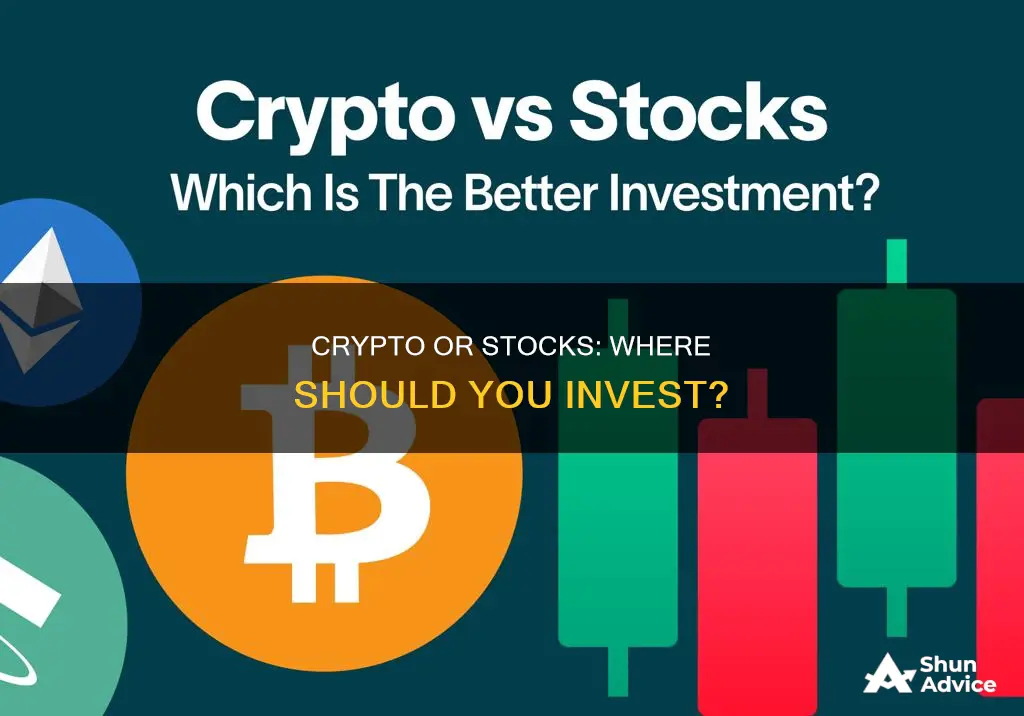
Investing in stocks or cryptocurrencies is a hotly debated topic. Both have their pros and cons, and the right choice depends on an individual's financial goals, risk appetite, and investment horizon.
Stocks are considered a more stable and traditional investment option, offering ownership in a company and the potential for steady returns. On the other hand, cryptocurrencies are newer and more volatile, providing an opportunity for higher gains but also carrying more risk.
When deciding between the two, it's essential to consider factors such as volatility, regulation, security, and diversification. Stocks have a long history and are heavely regulated, while the crypto market is still relatively new and largely unregulated. This lack of regulation adds an element of risk to crypto investments.
In terms of price volatility, stocks generally experience less extreme fluctuations compared to cryptocurrencies, which can be extremely volatile due to their speculative nature and lack of backing by physical assets.
Another key difference lies in the level of privacy and decentralization offered by each option. Cryptocurrencies are decentralized and provide enhanced privacy features, while stocks are traded on regulated exchanges, offering more security and transparency.
Ultimately, the decision to invest in stocks or cryptocurrencies depends on an individual's financial goals and risk tolerance. For those seeking higher potential returns and comfortable with higher risk, cryptocurrencies may be attractive. However, for those prioritizing stability and a more established investment option, stocks might be the preferred choice.
| Characteristics | Values |
|---|---|
| Returns | Cryptocurrency has the potential for significant returns and losses. $1,000 invested in cryptocurrency grew to $27,000 over five years. From 2016 to 2021, that's a compound annual growth rate of 94%. The S&P 500 outperformed the cryptocurrency index in 2021. |
| Volatility | Cryptocurrency is more volatile than stocks. From 2013 to 2022, cryptocurrency was four times more volatile than the S&P 500 and 26 times more volatile than bonds. |
| Correlation | Cryptocurrency and stocks have become more correlated through 2021 into the start of 2022, suggesting that cryptocurrencies may not be viable as a store of value. |
| Risk | Cryptocurrency is riskier than stocks due to its volatility and lack of regulation. |
| Regulation | Stocks are heavily regulated through government agencies such as the Securities and Exchange Commission (SEC). Cryptocurrency is largely unregulated, although the U.S. and other governments are working on establishing regulations. |
| Accessibility | It is easier than ever to invest in stocks with many online brokers cutting trading fees to zero. Cryptocurrency can be bought on exchanges or directly from ATMs and brokerages. |
| History | Stocks have a long history, with the first stock exchange formed in 1611. Cryptocurrency has been around since 2009. |
What You'll Learn
- Volatility: Crypto is more volatile than stocks, with higher risk and potential for greater reward
- Regulation: Stocks are highly regulated, while crypto is less so, making it a wilder investment
- Scams and Security Risks: Both are vulnerable to scams, but the newer crypto market is a bigger target
- Diversification: Stocks offer more options for diversification, reducing risk
- Intrinsic Value: Stocks have intrinsic value, while crypto does not

Volatility: Crypto is more volatile than stocks, with higher risk and potential for greater reward
Volatility is a key differentiator between crypto and stocks. Cryptocurrencies are highly volatile, offering the potential for high returns but also high risk. In contrast, stocks are generally less volatile and are tied to corporate earnings and financial reports. While stock prices can fluctuate due to business cycles and market downturns, they don't exhibit the same extreme price swings as cryptocurrencies.
Cryptocurrency prices can fluctuate wildly on a daily basis, driven primarily by speculative trading and investor sentiment rather than the underlying business performance. This volatility is due in part to the relatively small total market size of cryptocurrencies and their sensitivity to regulatory changes. The lack of standardised global regulation also means that cryptocurrencies can be more susceptible to fraud or manipulation.
On the other hand, stocks are grounded in tangible entities and are deeply entrenched in our financial systems. They are tied to the financial performance of a company, with stock prices influenced by corporate earnings and long-term growth prospects. Stocks are also highly regulated, with strict requirements for companies to disclose accurate financial information, providing a level of protection for investors.
The higher volatility of cryptocurrencies translates to higher risk but also the potential for greater rewards. This makes crypto a riskier investment option, more suitable for those seeking higher returns and willing to tolerate greater uncertainty. Stocks, on the other hand, are generally considered safer, more stable investments, particularly for long-term investment horizons.
Overall, the decision to invest in crypto or stocks depends on an individual's risk tolerance, financial goals, and understanding of each asset class. While stocks provide a sense of security and have a long track record of solid returns, cryptocurrencies offer the allure of high returns and exposure to technological innovations.
Bitcoin Investment: Good or Bad Idea?
You may want to see also

Regulation: Stocks are highly regulated, while crypto is less so, making it a wilder investment
The stock market is highly regulated, structured, and operates through established exchanges like the New York Stock Exchange (NYSE) or the London Stock Exchange (LSE). A multitude of rules exist to protect investors, with strict requirements for companies to disclose accurate financial information regularly. Stock markets are regulated by government bodies, providing a level of protection to investors not present in the largely unregulated crypto space.
On the other hand, cryptocurrency markets are less regulated and more decentralised. While some countries have started to set up regulatory frameworks, others have banned cryptocurrencies outright. This lack of standardised global regulation means that while cryptocurrencies may offer increased privacy and freedom, they also harbour a greater risk of fraud or manipulation.
The crypto market does not have to deal with international laws and regulations and the market is in motion 24/7. There is no ownership when you are active in the crypto market and you do not get paid dividends.
The stock market is incredibly strict in terms of laws and regulations, with all the associated penalties for non-compliance. Stocks are traded on accredited exchanges worldwide and are built to handle large trading volumes every day. Exchanges are strictly regulated (although specifics vary by country), providing protections to buyers and sellers.
Cryptocurrencies remain largely unregulated, which, for some crypto investors, is a mark in crypto's favour. Crypto markets know no borders and are beholden to no governments. However, it leaves crypto buyers with no protection if something goes wrong with their investment.
BlackRock's Bitcoin Investment: Millions Poured In
You may want to see also

Scams and Security Risks: Both are vulnerable to scams, but the newer crypto market is a bigger target
Both stocks and cryptocurrencies are vulnerable to scams, but the newer crypto market is a bigger target for scammers.
Scams are a common feature of the cryptocurrency market, with fraudsters employing a variety of tactics to lure victims into fraudulent crypto investments. Scammers often impersonate celebrities or romantic interests to gain the trust of their victims. They may also pose as legitimate businesses or government agencies to trick people into sending them cryptocurrency.
Another common scam is the "pig-butchering scam", where fraudsters befriend their victims, gain their trust, and then convince them to transfer their crypto assets to fraudulent trading platforms. These platforms often promise huge returns and may even show fake profits to keep their victims engaged. However, when victims try to withdraw their funds, they are met with a variety of excuses and demands for additional payments.
To avoid scams, it is important to be cautious when approached by strangers online, especially those promising guaranteed profits or big returns. It is also advisable to stick with reputable exchanges and wallets and to do thorough research before investing in any crypto-related project.
A Beginner's Guide to Investing in Coinbase Index Funds
You may want to see also

Diversification: Stocks offer more options for diversification, reducing risk
Diversification is a key consideration when investing. A sound investment portfolio should contain a diverse mix of assets to spread risk. Stocks offer more options for diversification than cryptocurrencies, reducing risk.
If you choose to invest in stocks over crypto, you can select from companies in practically any sector and country worldwide. You can be a shareholder in the Japanese automobile industry or in US-based tech companies, and everything in between. This allows you to put together a highly diverse portfolio that isn't fully dependent on particular industries or geographical markets. In turn, this can help reduce your risk of losing everything.
While there are many different types of cryptocurrencies and various kinds of crypto assets, such as NFTs, there are fewer options to diversify with crypto than with stocks. While you can reduce risk by ensuring you don't buy just one type of crypto coin, there's really no easy way to fully diversify your investments. This leaves you in a more risky position if you put all your money in one type of coin, or a small handful of them.
Stocks have been the go-to investment to build wealth for individuals and organisations for most of the 20th century and into the 21st century. They've established themselves as a pillar of the financial system. The London Stock Exchange alone has close to a million transactions a day, and the New York Stock Exchange sees 2.4 billion shares change hands daily. For investors, stocks have generally offered reasonably consistent returns, although investments can fluctuate up and down. For instance, the average annual stock market return was 13.9% for the S&P 500 Index from 2011 through 2020.
Cryptocurrency, on the other hand, is very much the new kid on the block, having been around since just 2009. Starting with the publication of Satoshi Nakamoto's white paper on Bitcoin in 2008, cryptocurrencies have skyrocketed in terms of both public awareness and interest. In 2020/2021, Bitcoin saw between 300,000 and 400,000 transactions daily, with Ethereum (Ether) even hitting more than a million transactions per day in July 2021.
The regulatory future for cryptocurrencies is uncertain, and many investors simply won't enter the crypto market until there's a clear rulebook in place. The U.S. government has several different agencies working out how crypto regulations should look in the long run, but they are just getting started. Should cryptocurrencies be subject to the same rules as the stock market? Or are they a completely different animal that deserves a whole new rulebook?
The lack of proper regulation adds an uncomfortable amount of risk to the crypto market. Until governments figure out how to manage this new class of digital assets, many investors will stay away for good reason. In particular, institutional investors won't capitalise on the fledgling market until they know how the government will tax the gains and how regulators will address fraud in cryptocurrency trading systems.
Given its inherent risks, cryptocurrency works better with a small allocation in your overall portfolio. Think 5% or less. Even a small allocation could do wonders for your portfolio if cryptocurrency really takes off. Also, limiting it to a small allocation protects you against a complete loss if crypto goes to zero.
If you're an experienced stock owner, you may want to add some crypto to your portfolio, but you should do that in small nibbles and make sure you're learning everything you can about the crypto market before taking that step.
Cryptocurrency Investment Strategies for Maximum Profit
You may want to see also

Intrinsic Value: Stocks have intrinsic value, while crypto does not
When considering whether to invest in crypto or stocks, it's important to understand the intrinsic value of each. Stocks have intrinsic value, while crypto does not. This means that stocks are tied to the performance and growth of a company, whereas crypto is not tied to any physical asset or underlying value.
Stocks convey ownership of a company, and investors benefit from the success and growth of the company, typically in the form of dividends or increases in the stock price. The value of a stock is influenced by various factors, such as sales, profits, and corporate performance. Stocks also provide stability and have been the go-to investment option for individuals and organizations for a long time.
On the other hand, cryptocurrency, by its nature, lacks intrinsic value. Cryptocurrencies are not issued by a central authority and are not pegged to the value of a fiat currency or a commodity like gold. The value of crypto is determined by market demand and supply, and it exists solely as a digital asset. While some argue that the underlying blockchain technology provides value to crypto, it is important to distinguish between the value of the technology and the value of the cryptocurrency itself.
The lack of intrinsic value in crypto has led to concerns about its long-term viability and stability. Crypto markets are highly volatile, with rapid and significant price fluctuations. Additionally, the unregulated nature of crypto and the lack of government backing add to the risk. However, it's worth noting that crypto has grown in popularity and acceptance, with some businesses and countries adopting its use.
In contrast, stocks provide a more stable and regulated investment option. Stock exchanges are highly regulated, providing protections to buyers and sellers. Stocks also offer transparency and security, with established systems and regulations in place to protect investors.
While crypto may offer the potential for high rewards, it also carries a higher risk due to its lack of intrinsic value. Stocks, on the other hand, have a long history of providing stable investment opportunities and are tied to the performance and growth of companies. Therefore, when considering crypto vs. stocks, it's essential to understand the intrinsic value, or lack thereof, and how it impacts the overall investment strategy and risk tolerance.
Strategies for Investing in the a16z Crypto Fund
You may want to see also







